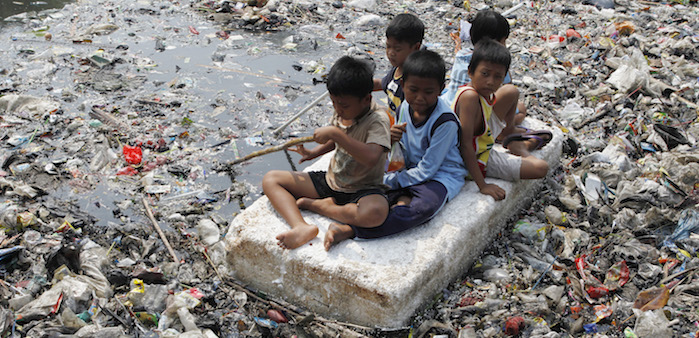
Title: The Global Climate Dilemma: Disproportionate Effects of Environmental Harm and Conflict
A recent article in the journal Communications Earth & Environment reveals a concerning global dilemma: the countries predominantly accountable for environmental destruction are frequently the least impacted by its effects, whereas nations contributing minimally to climate change endure the greatest difficulties. This contradiction challenges established beliefs and uncovers a significant pattern of global inequality that primarily impacts vulnerable populations in the Global South.
Researchers Richard (Drew) Marcantonio from the University of Notre Dame and Sean Field from the University of Wyoming state that their results necessitate a reevaluation of how peace and environmental sustainability are assessed and pursued globally.
Reassessing the Relationship Between Peace and Sustainability
Long-standing metrics have suggested that nations characterized by peace are also environmentally sustainable. However, these beliefs falter under scrutiny. In analyzing data from 2010 to 2022 through various global indicators, the researchers uncovered a surprising, inverse correlation: nations that score high on domestic peace frameworks tend to have more significant ecological and environmental footprints.
Essential conclusions drawn from the study include:
– Affluent nations scoring high on peace indexes frequently rank poorly in terms of environmental sustainability when considering their carbon emissions, resource consumption, and ecological impacts.
– Nations with lower carbon outputs and resource utilization—predominantly countries in Africa, South Asia, and Latin America—appear to be more susceptible to environmental threats and display elevated levels of internal conflict.
– Wealthy countries often shift their environmental and conflict-related repercussions by consuming resources harvested in the Global South and engaging in overseas conflicts while avoiding domestic turmoil.
Marcantonio notes, “Our study underscores the deficit in existing research that examines the link between ecological sustainability and peace. This is vital for developing evidence-based policies that tackle global disparities and uphold human dignity.”
A Thorough Examination of the Indicators
Prior research and sustainability assessments have typically relied on aggregate national data that fail to account for the genuine environmental costs of consumption and conflict involvement. To remedy this, the new study utilized more comprehensive indicators, including:
– CO2 emissions per capita
– Overall ecological and material footprints
– Levels of engagement in foreign conflicts
– Susceptibility to environmental hazards such as flooding, drought, and food insecurity
These broader metrics provide a significantly different perspective on global sustainability.
For instance, while nations like Norway, the United States, and Canada score favorably on conventional peace and prosperity measures, they also maintain disproportionately high material and ecological footprints. On the other hand, countries like Madagascar, Nepal, and Haiti—those with minimal emissions—experience direct impacts of climate change, such as rising sea levels, desertification, and severe weather.
Climate Change as a Catalyst for Discord
The connection between environmental pressures and social instability is well-documented. Climate change-related events like droughts, floods, and agricultural failures lead to resource scarcity, displacement, and weakened governance—creating conditions conducive to conflict. Now more than ever, these dynamics pose threats to the Global South, jeopardizing livelihoods and regional stability.
The study indicates that internal conflict is more common in nations grappling with serious environmental challenges yet recording low per-capita emissions. Conversely, wealthier nations maintain domestic tranquility while indirectly exacerbating environmental degradation and geopolitical turmoil elsewhere.
Reenvisioning the Route to Sustainable Peace
Despite the stark truths, the authors contend that the inverse association between peace and sustainability is not a permanent principle. Ecologically sustainable peace—characterized by mutual environmental care and internal stability—is attainable but calls for transformative structural and political reforms.
Marcantonio emphasizes the necessity of addressing a pivotal question moving ahead: “How can we secure a satisfactory life for everyone within the planet’s limits?” This strategy advocates for:
– Rethinking global development models to favor sustainable livelihoods over extractive practices
– Incorporating environmental justice into international peace-building and security efforts
– Encouraging policy measures that diminish unsustainable consumption in affluent nations while bolstering climate resilience in the Global South
Policy and Research Ramifications
The ramifications of the study reach deeply into the fields of climate policy, diplomacy, development, and international security. It implies that existing frameworks are misaligned with the intertwined nature of global peace and sustainability.
Future inquiries need to transcend national averages and confront the externalization of environmental and conflict-related effects. Rather than treating peace and sustainability separately, they should be recognized as interlinked components of a unified global framework.
Integrating this understanding into international policymaking necessitates:
– Adjusting global environmental and peace indices to account for impacts related to consumption and externalized conflict
– Strengthening support for nations most vulnerable to climate threats, including through climate financing and technology sharing
– Ensuring that strategies for conflict prevention consider environmental risk elements and local circumstances
Conclusion: Towards a Fair Climate Future
As climate change accelerates and global inequality intensifies, this study highlights the pressing need to realign global values with collective responsibility and shared survival. Ecological sustainability and peace are not inherently conflicting—but achieving both demands a transformative shift that places equity and planetary limits at the core of international collaboration.
“We hope this research will